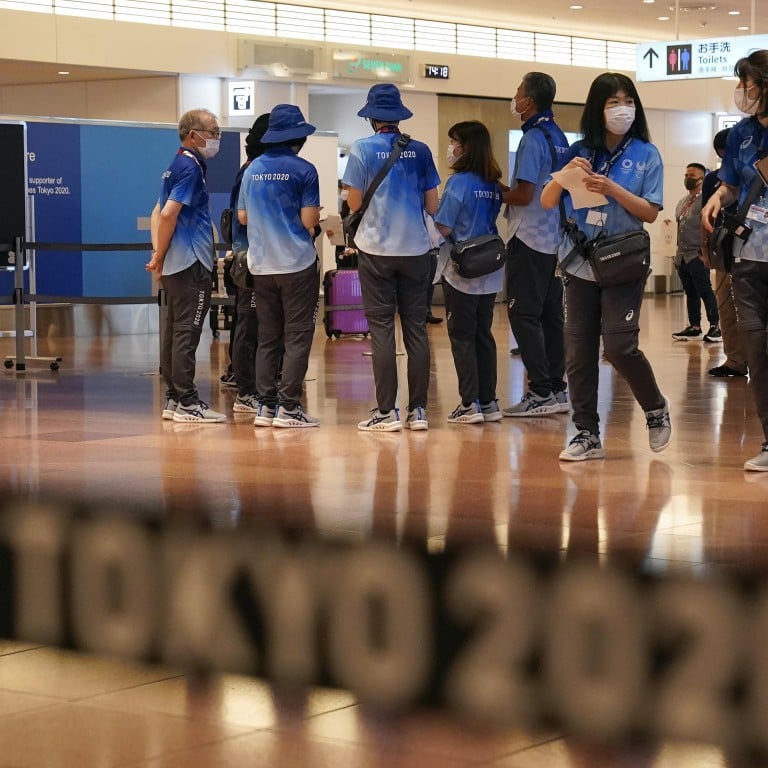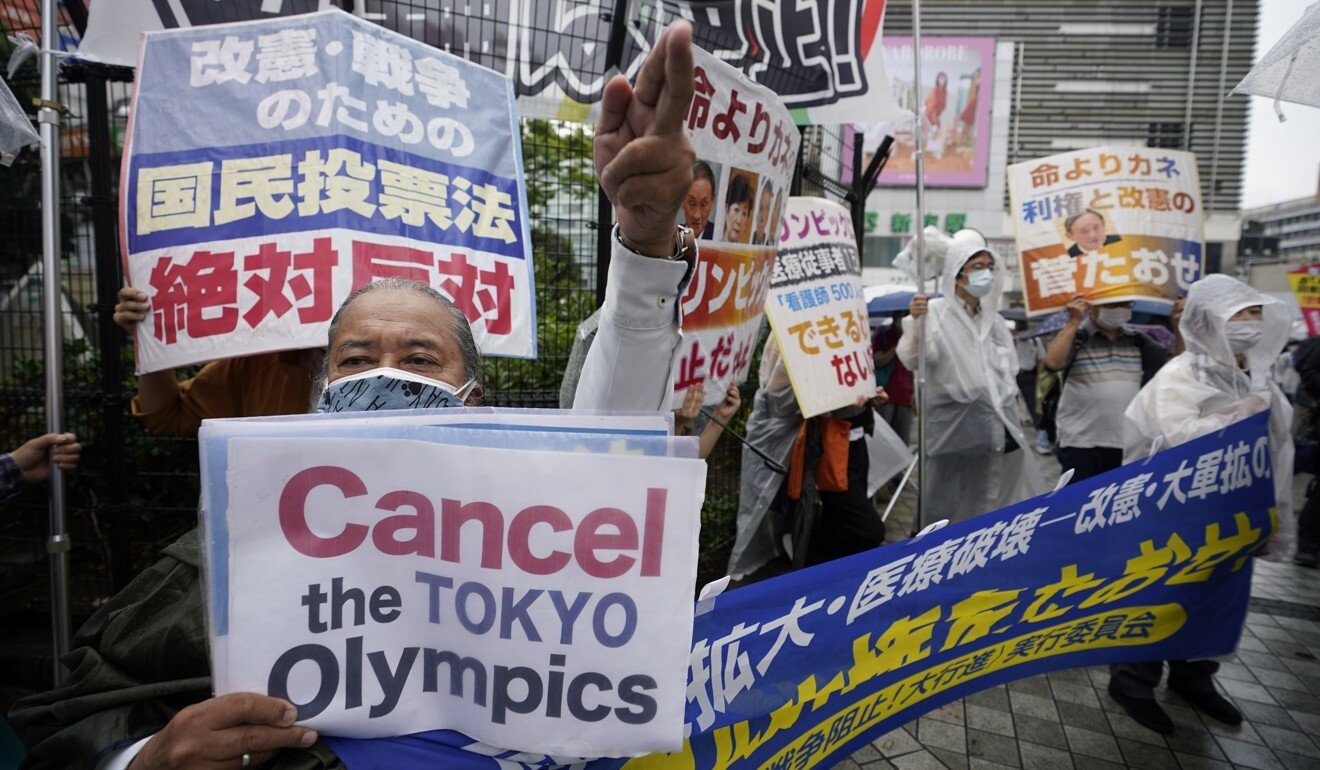
As athletes arrive for the Tokyo Olympics, foreign students at Japan’s universities are left stranded
- The plight of foreign residents barred from the country is under the spotlight as 11,000 sportspeople from around the world converge on the capital
- A professor based in Japan says the situation does not bode well for universities that have been trying to attract overseas students
Buenos Aires is 12 hours behind Tokyo, meaning she has to burn the midnight oil to engage in online discussions with classmates – and by 7am, when her other child, a three-year-old, is awake, it is time to get through the rest of the day “like a zombie”, she says.
It was not supposed to be like this. Bertone, 40, had planned to be in the Japanese capital for her two-year degree, but strict pandemic-related border control measures that have kept foreign residents out of the country put paid to that plan.
Similarly, Shani Weiss from Tel Aviv resigned from her job and moved out of her flat in March last year, expecting she would soon be moving to Tokyo to pursue her master’s in global studies at Sophia University.
A year on, Weiss, 29, is still living with her parents, while her programme began earlier this year in an online-only capacity. She considers herself lucky to have received unemployment benefits; her peers in a similar situation have suffered consequences such as scrambling for a place to live without knowing when they would be able to move to Japan, and having no source of income.
More than 500 academics from Japanese institutions and working in areas related to the country last week faxed a letter to justice minister Yoko Kamikawa demanding more transparency regarding border control measures for foreign students. They have urged the ministry to reopen applications for long-term visa holders as well as their partners and family members.

04:23
Tokyo Olympics case cluster fears rise as first Covid-19 infections found at athletes’ village
Since April last year, Japan has closed its borders to all foreigners without valid residency status and also banned short-term travellers. Students and academic researchers were also originally left stranded, and only recently have some been able to enter.
Foreigners with residency permits have had to carefully consider whether they wanted to leave the country for funerals of loved ones, as there were tight quotas on those allowed to return, though these rules were eased in November. The quota was not applied to citizens.
The Japanese government in March began allowing non-resident spouses and children of Japanese nationals to enter the country – although the spread of the Delta variant has resulted in that scheme being suspended.
On the Facebook groups such as the “Return To Japan Support Group”, which has more than 21,000 members, there have been questions about why Japan is the only G7 nation – the group of seven industrialised nations that includes the likes of the United States and France – to discriminate between its foreign residents and citizens. The 2.8 million foreigners in Japan make up 2.2 per cent of its population of 126 million.
“This is disastrous from the standpoint of education, research and knowledge production,” said Chelsea Szendi Schieder, a professor at the faculty of economics at Aoyama Gakuin University in Tokyo, adding that the situation did not bode well in the long term for Japanese universities that had been trying to attract foreign students in recent years.
“What is even more upsetting is that my Japanese students can go to the US for their higher studies – and the Japanese government has prioritised students for vaccinations – but there is no reciprocity towards foreign students who are enrolled in universities in Japan,” said Schieder, who is from the US.
Schieder also queried the oft-cited rationale that not proceeding with the Tokyo Games would impact athletes’ careers. “Students and researchers have also toiled throughout their lives to build their careers,” she said. “So why is it that the careers of sportspersons are prioritised over those of students?”
Olympics organisers had earlier barred foreign spectators from the competition, and earlier this month also imposed a ban on domestic spectators. Foreign athletes do not need to be vaccinated to enter Japan, but have been told to remain in the Olympic Village “bubble” where they have to meet social distancing and testing requirements. They are not allowed to partake in tourism while in the country.

For foreign students stuck outside Japan, however, the rules are being applied without flexibility. Bertone, in Buenos Aires, said about 30 per cent of her classmates were attending classes online when it was nighttime for them, and suggested that the university could have considered recording lectures.
Deadlines were also written in stone, she said, and requests for extensions owing to the time difference had been rejected by professors.
Tel Aviv-based Weiss said she had been told by her university that she might be allowed to travel to Japan after the Olympics, but added that her experience with Japanese bureaucracy was a reason for her decision to not stay on in the country after completing her programme. “I will always be a foreigner here,” she said.
Schieder from Aoyama Gakuin University said the policy of keeping foreign students out had unfortunately given rise among local Japanese students to “xenophobic discourse about contagion [that] risks fanning these flames that are latent in Japan”.
Bertone said she had always had a romanticised view of Japan as welcoming of foreigners, but was now feeling discriminated against for having children.
“I am expected to perform at my university as if I am a 20-year-old carefree student living in a dorm,” she said, adding that she had given up hope of going to Japan and thus expanding her legal career to an international realm.
“It is also very patronising; there is no acknowledgement of my successful career as a lawyer and a mother. At one point, I was told I could enter Japan but not with my family, despite everyone in the university having seen me breastfeed my toddler during the online classes.”
While Schieder is sceptical the academics’ letter to the Ministry of Justice will have much in the way of results, she hopes it will trigger a conversation.
“The stories of students who have suffered are so heartbreaking; the least we can do is write a letter,” she said. “The sensei [teacher] position is deeply respected in Japanese culture, and hence I hope this letter will be taken seriously.”

